#breadth vs depth
Text
the cool thing about me is that i get along with everyone because i have experienced such wide plethora of things medias skills hobbies. I have had really good conversations with people because I have recognized and talked to them about things they are interested in that i have dabbled in.
#this ks me tryi g to talk myself up about the depth vs breadth thing#this is honestly the biggest positive of breadth that ive seen thus far#heeho#warbling#ignore this
3 notes
·
View notes
Note
not that i care but it’s so crazy to me how liams got more spotify monthly listeners than louis like. i genuinely do not understand it cos no disrespect to him but liam’s album was a flop and he definitely couldn’t sell tours the way louis does. so where are all those listeners coming from???
huh good question! (He currently has 5 million to Louis' 4 million.) I would guess that the main reason is because so many of his songs are collabs (plus a little additional lifetime boost from Strip That Down still being on playlists)? Like for example every time one of Rita Ora's 11 million listeners or Alesso's 19 m or Jonas Blue or Zedd's 16 m play their artist playlist, or someone listens to the 50 Shades or Ron's Gone Wrong soundtrack, Liam gets a listener tallied. And he has way more collabs than I just listed! SO MANY! It's actually a clever strategy- he may not be able to sell tours but I wouldn't be surprised if he pulls in more royalty money than Louis, you know? Anyway so anyone who lets a Liam song play through one time gets counted as a monthly listener. Whereas a decent chunk of Louis' listeners are probably listening to multiple songs daily; but in 'monthly listener' counts that is still just 1 person, same as someone who just hears one song on a playlist.
#blah blah blah#second paragraph started out It's illustrative of their very different strategies and presences actually...#but sad news I'm too brain melted by meds right now to actually get that essay out#but like we all know that anyway right?#like ralph says breadth vs depth#louis' listeners may be fewer but I bet they listen to him so much more#and buy the album and tour tickets#quantity vs commitment
0 notes
Text
I'm watching an lp of the splat2 single player and it's really just reinforcing how disappointed I am w the splat3 single player..... rip
#wastepaper basket#Idek what it is exactly cause I don't think it's just nostalgia bias it just feels like it's..... lacking something#I think it's like. All of the good stuff in 3 was also in 2 but 2 has so much more character imo & the level design is a lot more cohesive#3 feels so disjointed & god the differences in boss design!!!#The bosses in 2 are so unique and creative and 3 the bosses are like. Just not on the same level (once again imo)#Even if there are some cool concepts yes and I do like deep cut#Idk I think it might be a breadth vs depth thing. Or something. It just doesn't hit for me in the same way#Btw this is ONLY the singleplayer I'm talking about I never played the multiplayer in 2 but it looks like it's been much improved
0 notes
Text
It’s amazing how many normie women will agree with the basic concepts of radical feminism if you don’t frame them as Radical Feminism(tm). Things like porn culture, sex vs gender, male violence, are all observable and radfem conclusions are logical. It’s just when you start bringing out the theory of why it’s like this that women get skittish. Which is understandable—fully understanding the breadth and depth of misogyny is scary, and for a lot of women, it’s too much, and they will disengage.
But some women won’t, and while they might not read Dworkin or call themselves radfems, they’ll be more aware of how to protect and love themselves and other women, and might become politically active if they weren’t already. That’s the end goal for me—I don’t really care what women call themselves, I’m just happy they’re striving for female solidarity and class consciousness, even if they don’t use those words.
1K notes
·
View notes
Note
what would you put on a political theory syllabus if you could
like an intro/survey course? so the conventional theory class in Anglo-American poli-phil goes roughly like this: Plato/Aristotle -> Machiavelli (if you fuck nasty) -> Hobbes/Locke/Rousseau -> J.S. Mill -> Marx (sometimes, and only with the disclaimer that this guy needs to lighten up!) -> omission of like 120 years of global thought, including the shifts wrought by two World Wars, postcolonialism, and 1968 -> Rawls. there's usually, but not consistently, some idiosyncratic liberal picks from the various omitted periods/regions based on whatever the academic in question is preoccupied with, or attempts (sometimes sincere, sometimes half-hearted) to add some diversity to the lineup, most typically some form of liberal-leaning writings on feminism or racism or occasionally postcolonialism.
I think this abridged history is like, okay but not great (Charles Mills' Decolonizing Political Philosophy is a great piece on why). it’s produced by a combination of both the discipline's narrow post-Rawls liberal paradigm, and the constraints of intro/survey courses, which aim for breadth rather than depth (which I think is generally reasonable at least on its face), so the trick I would want to pull off is making something that works within the latter constraint while not succumbing to the paradigm.
the question sort of demands interrogating what a theory class is for in the ideal sense, what it uniquely can offer (so, going beyond specific skills that can be developed in other ways, like learning to write, understand, critique, and respond to long-form argument, or the more cynical pipeline-to-labor stuff like credentialing).
I think some main goals would be 1) contextualizing your existence in the world as a political subject, 2) be able to pass an ideological Turing test, i.e. accurately represent the substance of different perspectives and worldviews such that you could "pass" for the authentic thing [so I would include writers/writings that I detest for KYE reasons], 3) increase your autonomy as a political agent and ability to recognize how these various concepts and systems underlie the fabric of our political language and practice and how you can apply them in reality in collaboration with others.
an extension of these goals, imo, is that political thought without a history is dead in the water - this is why I have kind of a hardline opposition to trying to learn political theory mostly through social media and why "leftist theory recs" on here usually drive me absolutely crazy. so any teaching of these readings would probably require a decent level of contextualization.
then there's a question of structure. my intro class was actually pretty enjoyable despite following the pattern described above, as my prof centered the class around different chapters of Plato's Republic, using each chapter as a jumping off point to talk about connections with a more modern political thinker while also incorporating some short fiction of Octavia Butler. cool stuff! I think organizing around theme is edifying. there's tradeoffs to doing chronological vs thematic organization of readings though, which I want to keep in mind
so with all that I think it would look roughly like this (though frankly my reach might be exceeding my grasp), and you could pretty much reorganize the readings to be chronological if you wanted:
"The Political"/Power: I think spending some time on "metapolitics" is important, like what politics is and what the function of political philosophy is. So start with some different perspectives on realism vs. idealism (the Republic, the Melian dialogue, The Prince) and sliding into competing definitions of politics as conflict vs consensus (the Arendt/Fanon and Schmitt/Benjamin "debates")
Authority: Hobbes/Rousseau/Hume on the social contract, the Crito/Thoreau/MLK on civil disobedience, ideally an anarchist of some stripe (would rather include Bakunin or Kropotkin but R.P. Wolff might be the more cohesive move)
Equality/Property: Locke's Second Treatise, Rousseau's Discourse on Inequality, The Communist Manifesto and/or Marx on primitive accumulation as an alternative genealogy of property/money, Nietzsche's Genealogy of Morality as illustrative of a reactionary/aristocratic perspective on equality (you could swap in Aristotle instead for a different take), Fanon in Black Skins White Masks
Justice: Plato, Rawls on distributive justice, Nussbaum on capabilities/global justice, Mills on the racial contract
Freedom: Mill's On Liberty, Marcuse's "Critique of Pure Tolerance," some chapters from Capital V1, "Throwing Like a Girl" by Young (plus maybe some Beauvoir/Wittig). work in Berlin and Pettit's competing ideas of liberty
then maybe end on Foucault writing in a broad mode about subjectivity OR Benjamin's "On the Concept of History" - either would be good for a kind of "call to action" that I like in a politics class
there are some concepts that might warrant their own segment (domination, violence, sovereignty, revolution, security, progress - I waffled on making "property" its own unit), but I'm trying to not go too crazy (and it's possible they could get folded into other concepts as corollaries). I'm also leaving out various authors that I do think merit inclusion (Adorno, Dewey, D&G, Lenin & Mao, Althusser, Davis, various contemporary writers), but I would probably follow the path of my Middle Eastern Politics professor - put supplemental/suggested readings in there for the freaks that like this stuff.
and finally I think the above is more tailored to be an introduction (if a somewhat sweeping one), you could take an alternative tack and construct "contemporary issues in political theory" (e.g. migration/refugees, climate, economic crisis, security state/surveillance) and I think that would also be a rewarding survey
41 notes
·
View notes
Text
[...] As the game begins, your character arrives in a remote corner of the world of Eora called the Living Lands as an envoy of the Aedyr Empire, where you've been sent to investigate a mysterious plague. "Not everybody in the Living Lands is super thrilled to have an imperial presence in this far-flung land," she said. "So adventure ensues."
[...] CEO Feargus Urquhart told me that in scope Avowed is more akin to Obsidian's past RPGs like The Outer Worlds in size than it is a sprawling open world a la Skyrim, though that was actually Obsidian's initial pitch. When the developers sat down and focused on what Obsidian does best—stories and companions, in particular—the more compact scale came naturally.
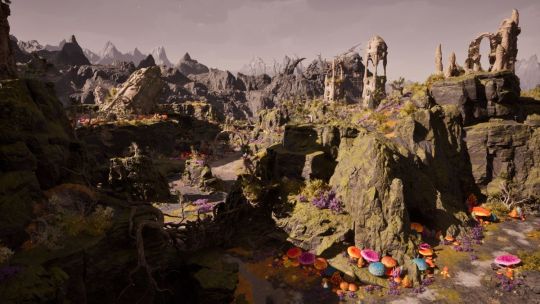
The way you interact with other characters in Avowed will be similar to The Outer Worlds, where your dialogue options reflect the tone you want to want to use. "We try to hit a sweet spot when we're writing dialogue options where we invest enough personality for those options to be fun and interesting, but also leave enough space around them so that the player can really invest whatever headcanon they built for their character into that option," she said.
Patel wouldn't spill much about Avowed's story, but did give me some of the basics on what form of RPG to expect from Avowed:
You have an established role as the imperial envoy, but your "personality, appearance, and philosophy and vibe you bring to that role is up to you as a player to decide"
You can play as a human or an elf, but not other races
It's purely singleplayer—no co-op
The world is lightly systemic: think water and lightning interactions, but not the ol' bucket-on-the-head trick
You'll have two companions with you at a time, with their own combat specialties and, of course, personalities
There are several ability trees to progress through, and you won't be locked to a particular class or playstyle
You will level up, but the focus is on unlocking abilities rather than putting points into stats to grow stronger
Early in development, when Obsidian decided to prioritize a story "more focused on depth than breadth," the first-person combat ended up benefitting, too. Patel said that it was an example of a piece of Avowed that was surprisingly fun in their first vertical slice, a time when the team has to decide on what to commit more resources to and what to scale back on. Combat became a key focus, which should be music to the ears of every Elder Scrolls player who's always found the sword-swinging a bit wimpy. "Our combat has come along really, really well, and the bones have been there since the beginning," she said.
Patel cited a lot of time spent tuning the feel of swinging a sword vs. a mace vs. an axe to make combat feel right, but the options available to players seem like the more significant element at play here. You're free to dual-wield weapons, wield both magic and melee simultaneously, and as in Pillars of Eternity, there are some old timey guns available. When I brought up how bored I am of game loot with imperceptible stat differences from one sword to another, she said that's been on their mind, too.

"The way we've tried to approach that is erring on the side of fewer but meaningful upgrades. If you're upgrading your weapon from one tier to the next, you should feel the difference. If it's a small number change next to your item name, that's not going to feel as meaningful as going through an upgrade process, trying your weapon again and realizing it's doing a lot more damage. Fewer but more meaningful upgrade tiers."
From today's trailer, magic looks like it could be the bit of Avowed that really gives it its own fantasy flair. There's some excellent hand animation at work when the envoy draws runes in the air to conjure a fireball and later lifts a pulsing void skyward, sending a pile of guards orbiting weightlessly around it. I want a whole lot more of that, and I'm excited that I can mix magic with melee without being railroaded into a class.
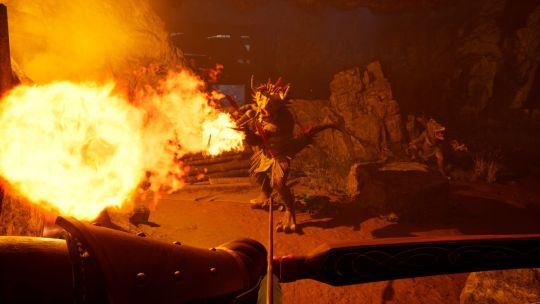
"In most of our games companions have been optional, which I think offers a wonderful degree of choice to players, but it means there's a limit to how deeply you can tie them into the core story. With Avowed we decided companions are going to be core. They're going to be part of the experience. And that means we can invest so much more in them and tie them much more closely, and personally, to the events and the parts of the world the player is encountering."
And can they die?
This time there was a pause. "You'll have to see," Patel said. Until 2024, then.
89 notes
·
View notes
Text
resolutions tag!! thanks for tagging me @socialtownie + @homewardial 🥰
what's your resolution for your simblr ? actually get around to posting more builds! even if that means simplifying way down on the build post, disrupting other queued content, and whatnot 🙈 and of course keep right on trucking with my bacc!
what do you want from the sims franchise ? features-wise, bands, cars, hotels. on the whole? a focus on depth vs. breadth with new animations and small details that surprise and delight
any other new year's resolutions ? eat more fresh fruits 🍊🍇🫐 and mend clothes 🪡🧵🧶
tagging @biffybobs @cantseemtohide @pixelshary @moonwoodhollow @cowplant-snacks @caffeinatedtrait — please ignore if you've already shared or aren't the resolutions type! 💗
24 notes
·
View notes
Note
I just found this blog and i love it!!! I have a few different questions so to make organizing easier im gonna ask one here and send the others separately so I apologize for the abundance of asks im about to send :D what are some of your favorite past jams or bundles?
THEME: Game Jams and Game Bundles.
Thank you so much! I will probably space out these answers so that other folks have a chance to get their questions answered first. But this one is a pretty fun one to start with.


I’m a sucker for charity bundles, to be sure. My first bundle was the Itch Bundle for Racial Justice and Equality, which was back in 2020. I filtered through all 50 pages and sorted all of the ttrpgs into folders - this was the start of my Itch organization. It also introduced me to quite a few games that showed me the amazing breadth of tabletop games, including Subway Runners, Visigoths vs Mall Goths, Troika, and i’m sorry did you say street magic. An additional recommendation I have from this bundle is Transmission Burst v.1 and Transmission Burst v.2, collections of evocative mini games by UFO Press.
One really impressive bundle was The Bundle for Ukraine, which had a staggering amount of tabletop games in it, including Thirsty Sword Lesbians, Apocalypse Frame, Lutong Banwa, and The Great Soul Train Robbery. I want to give a specific shout out to Bright & Terrible (Atlantean Exiles from a kingdom that fell), as well as Recipe on Kmiydish Paper, a solo gaming experience that fleshes out a world through a single recipe.
If you have bought a lot of charity bundles, I also recommend checking out Bundle Browser, which is a website that helps you sift through games by bundle and tag. I find it super helpful when I'm not sure I have a copy of a game, and clicking on the game brings you to its game page!



Now, let's talk about game jams. The Emotional Mecha Jam was a game jam in the beginning of 2019 that explore the depth of emotions that exist in the mecha genre. This jam inspired works such as A Long Night in the Mech Bay, All My Exes are in Mechsuits, and Breakup on Re-Entry. You should absolutely check this jam out.
In 2021, there was a jam called Applied Hope: The Solarpunk and Utopias Jam. I’ve talked about this jam recently, and it’s very very good. I love the theory and conversations sparked in this jam - the goal was to dream of possible worlds - not perfect ones, but ones that were brighter, worlds that could are meant to increase our capacity for joy. I’ve talked about a number of games here before, including subconscious_Routine, Waxworm, and After the World Drowned. I’m also intrigued by Scraps, which won the award for Best Solarpunk DIY game.
The BIPOC Vamp Jam was also a lot of fun! It was a jam that ran in 2021 and asked Black, Indigenous and Creators of Colour to submit their vampire games, in an effort to look at vampires through a different lens. I’ve talked about Vamp Camp and Bloodbeam Badlands before, but I’m also stoked about The Vamp is Dust, (a hack of The Witch is Dead), as well as Project: Day Breaker (Vampires in space!).

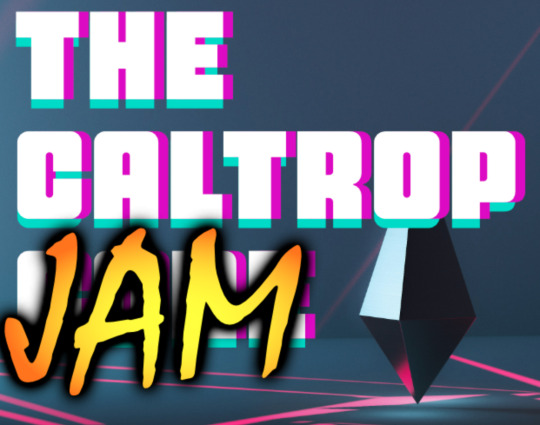
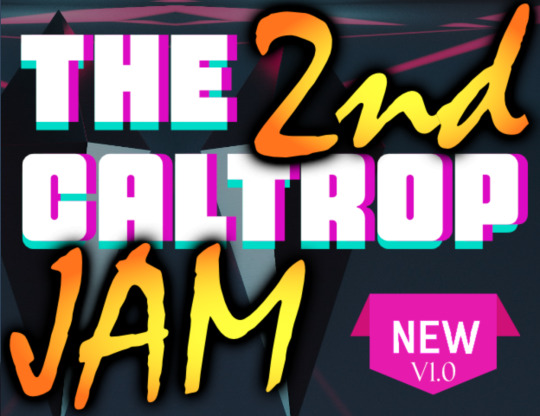
Some of my favourite jams are jams that are focused on a specific system. The What’s So Cool About Jam is one of those. It is a super simple system, and the jam is what introduced me to the WSCA ruleset, which is pretty light-weight system that can be translated to a lot of settings. I’ve personally been interested in What is So Cool About Sky Pirates, as well as What’s So Scary About Dinosaurs?.
Titanomachy also has a solid history of good game jams, as evidence by their first and second Caltrop Core jams. Caltrop Core has gotten some pretty big attention, because it’s so easy to hack! This can be seen in in HexFall, which is also by Lex, as well as SW//NG by @farmergadda (emotional superheroes), and Last Hope (dark magical girls). I’m also interested in The Dreaded & The Deep (nautical horror) and The Dying of the Light (a city struggling in the darkness).
29 notes
·
View notes
Text
看到别的《不灭》粉针对“长生不死”的看法,在下小感
// Some thoughts on Immortality vis-à-vis To Your Eternity
------------------
Why is there a (sometimes hidden) assumption that being immortal automatically means the following expectations:
being incredibly intelligent
hella knowledgeable
an expert generalist
"the one with the answer" in the entire group?
It's prevalent in pop culture which, I'm gonna guess, is a product of tons of fiction and myths that "say so."
But I think people take these assumptions for granted way too much and start to impose a universality that I don't think holds up to immortal characters who are human or possess human brains.
The qualifiers "human" and "possessing human brains" (or human cognition) are very important here. If this immortal is non-human, then this critique isn't aimed at them. Read on if you like, though.
The (human) brain is simply not an infinite memory space the way a computer database could theoretically be. Limitations are one of the most important factors that shape the course of a brain's evolution; hell, I once wrote a ramble regarding the difference between an AI's information processing vs. human cognition.
(Yes, it was outfitted with citations. Yes, it was completely unprompted and no one asked for it. At all. You may start to notice a pattern regarding me.)
Children generally get to learn and absorb as much information as they like with minimal cost until they're of a certain age, and then the pruning of neurons starts. The number of neurons we have is reduced because the brain now favors depth instead of breadth of knowledge. You cut off the things you don't actually need in your life to free new neurons for any domain that needs it.
This isn't just about memories. It's about things like your optical sense, your auditory sense, the whole shebang. Every part of your brain is constantly vying for free real estate to bolster its own domain; it's a relentless competition for neurons.
What does that mean?
It means even if you're immortal—so long as you're human or possess a human brain—you'll always be limited in your knowledge and skills. You can try to learn as many things as you want, but you're doing it at a cost, all the time.
Think about it. How well do you remember everything you've ever learned in school?
Do you remember the details of, say, the differing carbon pathways for C3 and C4 plants? Do you remember there are two kinds of mechanisms?
Do you remember how to calculate a region's longitude and latitude using their timezone via employing the Greenwich Meridian Line as a reference point, or a region of a known timezone?
Do you remember how to exchange inch to centimeter, or pound to kilogram, or Celsius to Fahrenheit, without using a converter?
How about recalling the detailed history of all four ancient civilizations and their ways of life: the Mesopotamian, the Egyptian, the Indus, and the Chinese?
So on, so forth. I don't know what everyone studied in their respective education system, but chances are, there is a lot of shit we have all "forgotten" even if we spent an inordinate amount of time committing them to memory back then. If you know the answer to any of these^ questions, then chances are you either just read/learn about them, or you regularly engage in this domain. Knowledge is never permanently stored in an individual's brain... because it can't. That's right; even skills and knowledge are not permanent in one's head. Impermanence, baby!
And that's my problem with the assumption of The All-Knowing Immortal.
While it's true that an immortal human has all the time in the world to study every knowledge humanity has accumulated as a whole, they can never have all knowledge at their fingertips, because at every acquisition of something new, they disregard what is judged to be unimportant and unnecessary by the brain to free up new neurons. There is always something the Immortal doesn't know—not because they have never heard of it, but because they have forgotten about it.
But surely immortality shapes someone such that they are different from a mortal being, right?
Correct! It does, and I think in at least two major ways:
(1) Expertise
Even a mortal being could gradually become an expert in one or—in the case of a polymath—various domains. Again, a mature brain favors depth instead of breadth. The more you practice, the more your neurons refine and develop, and the more skilled you become. That's how experts are created.
Since an Immortal has a lot more time (and with time comes resources and opportunities) to hone their skills in several domains, it stands that they will be incredibly expert in these domains over a long period.
The catch, though, is that they are only an expert in the domains they frequently engage in. It doesn't translate to being an expert in literally every other trade under the sun. It doesn't even mean they will become an instant expert after some light-reading about those trades because expertise ≠ genius. Some domains' knowledge may afford the Immortal an easier path to understanding related domains, but it still doesn't mean the Immortal is gonna be a pro and galaxy-brain at it without effort and cost.
(2) Experience
Experience is gained from how long one experiences life, so naturally, an Immortal is gonna have a lot of that. This is why I do agree that an Immortal should likely be one of the wisest in the group... but I don't think this rule should be universal to all immortal beings either.
What if an Immortal spent 40 years of their life in isolation, as a hermit, whose only occasional companion was a phantom-like observer who called them out anytime he felt like the Immortal was underwhelming?
The human brain's growth and learning depend on sociality. An isolated Immortal loses its most important source of learning, so of course, they would now be even less experienced than a poison-tasting woman who traveled around and recorded her adventures and knowledge in a book.
----
That's right. This post has always been about Fushi... because To Your Eternity was in the title of this ramble. Ha! Read the signpost before you enter next time, you dorks! I gotcha good!

While some criticisms against Fushi's suboptimal intelligence and knowledge are warranted (and even those that aren't warranted are still interesting arguments to think about), I think people's expectation of what an Immortal being should be has gotten in the way of them seeing/appreciating Fushi as a "different kind of Immortal."
Fushi's default form is a 14-year-old boy who, for the longest time, has been living alone. That's a boy who's been deprived of social learning for a long enough time that it might have caused some brain damage (technical). That's not counting the fact that a 14-year-old brain simply isn't mature and is easily overtaken by impulses.
I'm of the hypothesis that Fushi's beholden to the form they take; the proof is in how, whenever they change into one, they begin to exhibit their attributes.
Fushi's saddled with quite a lot of trauma—in fact, their trauma starts almost immediately and constantly after they are active beyond being a piece of rock or moss. What's the second word they learn after "Arigatou?" Wasn't it 痛い ("it hurts")?
All of that stuff can indirectly hamper their social learning.
Fushi's base Nameless Boy form may also just be... well, not good at social learning. Or, Fushi themself isn't good at it.
In other words, Fushi might just be... autistic. Bit of a headcanon there, though.
That's not all. While Fushi might have chosen to read a ton of books and whatnot, what do you think their interest will be? I don't think it's science, or politics, or philosophy, or looksmaxxing—the point is, they choose their own domains to engage in.
And even if they had read things like, I don't know, Trigonometry and Beauty or The Philosophy of Algebra or Sun Tzu's Art of War—my previous point about how knowledge can still be forgotten when those neurons fall into disuse still apply. And that's if Fushi was paying attention to what they were reading in the first place, because if you're not attentive, then good luck encoding things into your long-term memory effectively.
------
So what does all of this amount to?
Well, it means one may think Fushi is a dull-witted Immortal,...
...or think Fushi is a different kind of Immortal.
An Immortal that isn't as common a depiction as most others we knew in pop culture, to boot. Stil, they exhibit the two things Immortals should possess in abundance compared to a mortal being.
Firstly, they display expertise in wielding their powers (they are actually a very competent fighter come the Modern Arc and the Future Arc when they want to be). They are skilled at cooking and are generally the best at remembering the quirks, characteristics, and inclinations of every person they know well enough.
Why? Because these are the domains they engage in all the time.
Secondly, they exhibit an abundance of experience accumulated through their long lives. But here's the twist that I adore To Your Eternity for:
While the experience of an Immortal is usually depicted as a net benefit that shapes that Immortal into becoming wise, Fushi's abundance of experience as an Immortal is sometimes detrimental to them.
I'm talking, of course, about trauma as one of the main components of their experience.
We've discussed previously that Fushi's growth might have been hampered by the sheer trauma they had undergone at the start of the story. But here's the thing: their experience since then didn't exactly improve all the time. The grueling trial that was The Assault on Renril? Their previous attempts at fighting back Nokkers with varying results? Being stuck in a molten iron Prison Gate oh wow it's like Gojo ohmygod cube? Kahaku? You can list them yourself.
Even as normal human beings with limited timespan, we often find our own less-than-savory experience—including trauma—debilitating or even unbearable. Now imagine being an Immortal who keeps collecting experiences like these. Imagine yourself saddled with the suffering you've already gone through and beholden to more trauma and suffering as part of your experience living forever.
These are your experiences.
Have they made you exceptionally wise?
Not really?
Aye, that's the point.
-----
If I have to give a TL;DR for this, I guess it's:
"Guys, I think we should give Fushi a wee bit of break, doncha think, lads?"
I know they are an Immortal. And people expect an Immortal various things in a story. But they are also a lot more than what common depictions of eternal beings are like.
Fushi is, to me, a very interesting exploration of being an immortal, and one I appreciate for
deconstructing the assumptions people make about Immortals in general
and deconstructing the "shouldn't an Immortal be wise because of their experience" understanding most of us might have.
Thank you for reading my ramble. Check your eyesight when you have the chance just in case reading all of this gave you a myopia. Don't say I didn't warn ya!
-----------------------
I'm... gonna pretend this is my "Happy Fumetsu Tuesday/Wednesday" post of the week—which I haven't been doing for a while now. I might as well retroactively pretend this ramble was part of a tradition-that-is-never-really-observed-for-real, too.
#“小感”个屁!完全就是一篇论文!#啰嗦的睿得失#every time I write a ramble I wonder who the hell will even read this all#maybe when Season 3 start I should just reblog them to the surface for new audience#fumetsu no anata e#to your eternity#tye#fushi#fnae#immortality
9 notes
·
View notes
Note
What do you think a relationship between Lord Voldemort and Draco would be like? Would it be very different if it were Tom and Draco?
The age, experience and power dynamics make all the difference between the ships. I have no doubt Voldemort could trample a young Tom psychologically and physically just based on his experience alone. Imagine what he would do to poor little Draco 😂
I think it would be VERY different. Taco are on pretty equal footing. Tom might have magical might, charm and the burgeoning respect of their peers; but Draco holds far more societal power—both through his money and his family's connections and influence. Draco has a depth and breadth of knowledge of the wizarding world that it would take Tom decades to develop (similar to Ron's knowledge vs Hermione's). Voldemort, in contrast, is very much established and doesn't really need Draco for anything.
Voldemort is also going to compare Draco to Lucius, favourably or (probably) unfavourably. Whether he knows Abraxas is up to writer interpretation, but I don't believe there's anything in canon that indicates any familiarity. They could very well have no Hogwarts overlap at all. We know that Lucius rose very high at a very young age in Voldemort's army. Voldemort's treatment of Draco in canon is all about Lucius—humiliating, emasculating and punishing him for his betrayal. For Dracomort to ever stand on its own feet, Draco would need to forge an identity separate from Lucius, and Voldemort would need to see that.
Of course, the easiest way to write Dracomort is horny old rapey sadist gets emotionally attached 😂. Of all of the crossgen Voldemort ships, Dracomort is the easiest to write canon compliant because they... live together. Not writing it as dubcon (at least) is borderline impossible, so might as well go all in. I don't personally see Tom|Vee as particularly interested in sex though so that's my main struggle w/ writing him as a sex pest.
Part of the challenge is that while Draco does have some traits that Voldemort would value, he's far too scared of Voldemort to ever show his better traits around him.
I always think of Taco as not a 'destined in the stars' ship but rather a 'right place, right time' ship. Sure, there are other people they would be compatible with, but this is the love that they found and made work. Perhaps some might consider that cynical but I think realism is romantic. Now, 'right place, right time' makes Dracomort challenging since 'in the middle of the war with a 50 year age gap' does not necessarily meet that criteria hahaha.
17 notes
·
View notes
Note
As a followup to the breadth vs depth post you made, how would a solo dev focus on one aspect that they are interested in?
The short answer is "practice".
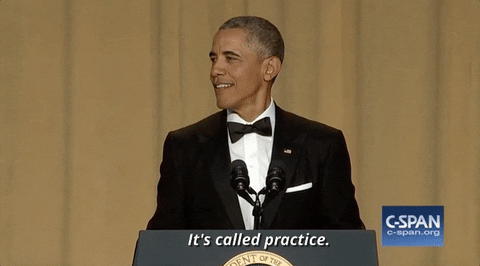
Game development is not a talent that people have, it is a skill that people learn. People have different amounts of talent that may make a skill more easy or difficult to learn, but skill matters far more than talent does. You don't earn skill overnight, you earn it by repeating a pretty standard process many, many times:
Build something new
Get some players to play it
Internalize what worked and what didn't about the thing you built
Use what you learned to build something new
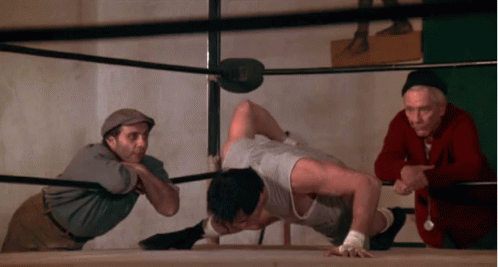
If someone wants to improve at level design, then the best course of action is to make levels. Build a level, get some players to play it, internalize what worked and what didn't about the level you built, and then use what you learned to build a new level. If you want to improve at system design, build a game system like a level-up system or a power-up system. If you want to improve at cinematic design, build cinematics. Write quests if you want to be a quest designer.

After repeating the build-play-internalize-learn cycle a few times, you'll start noticing the mistakes you made on your earlier attempts. They might be all you can see when you look back and you might even feel a bit embarrassed you ever made them. This is totally normal! It's actually a good thing! It means you're leveling up and improving - you're able to recognize and avoid mistakes that you weren't before. The ability to differentiate good and bad ideas is one of the abilities you gain from practice. As Bruce Lee said once, "I fear not the man who has practiced 10,000 kicks once, but I fear the man who has practiced one kick 10,000 times." The best way to improve any skill is to practice.
[Join us on Discord] and/or [Support us on Patreon]
Got a burning question you want answered?
Short questions: Ask a Game Dev on Twitter
Long questions: Ask a Game Dev on Tumblr
Frequent Questions: The FAQ
31 notes
·
View notes
Text
Originally I was going to add this to the ask @autistictenno recieved about nyx & excal but honestly it deserves it's own post. So here's a little history lesson on Warframe and Digital Extremes for y'all.
A lot of the early concepts for Warframe actually came from DE's older game, Dark Sector. I never played it myself but I've read a bit about it and have been around Warframe since it was in closed beta. Basically Dark Sector had a lot of sci-fi stuff planned for it that got cut and the final product was a bit like resident evil and the story followed Hayden Tenno who becomes mutated as a result of the 'technocyte virus' (cough cough Warframe infestation). The general plot involves him trying to stop a scientist from spreading the virus to the whole world. A lot of stuff about him influenced everyone's favorite frame Excalibur. The final boss of the game, Nemesis, also influenced some stuff about Nyx. This is hinted at with the proto deluxe skins you can buy for them in the Warframe market.
Here's some image comparisons between Dark Sector and the proto skins in Warframe. Some of the images come from the dark sector wiki (https://darksector.fandom.com/wiki/Special:AllPages) The others from this review (http://einfogames.com/reviews/dark-sector/) which was published in 2012, just after warframe was announced but before the closed beta for it started.
Here we have Hayden Tenno and Nemesis


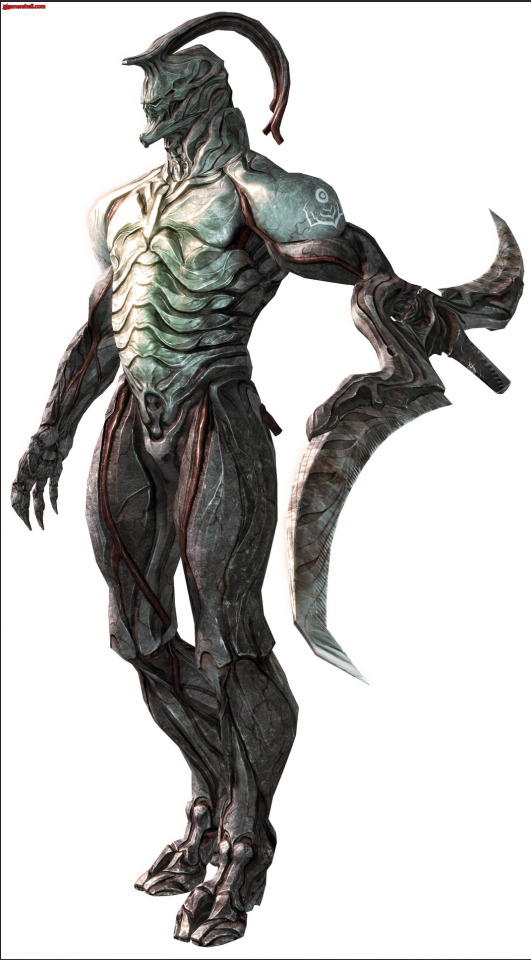
vs Excalibur and Nyx Proto skins (took screenshots of these myself)

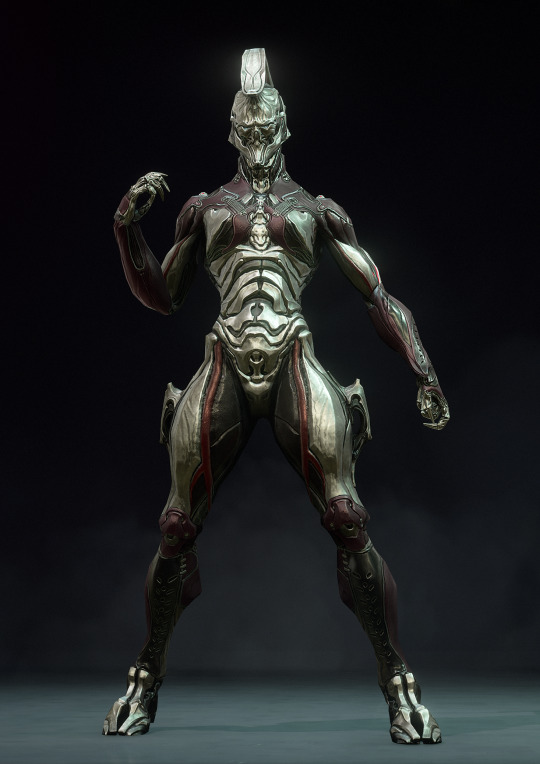
Even the iconic glaive got a proto skin (though it doesn't look that much different from the regular one in warframe)

Before Dark Sector DE mainly only did work-for-hire contracts and struggled getting a publisher for Dark Sector which is why a bunch of stuff got cut. The game only received moderate reviews and DE once again ended up doing work-for-hire contracts, and the studio almost became bankrupt before quickly scrambling to get Warframe out the door. They struggled getting a publisher for that too and ended up just doing a closed and then (endless) open beta for the game themselves, the only thing that kept them afloat was the founders program. After awhile, they got their lucky break and the game made it big. Like REALLY big. Like 4 million (losers) users big. Now it's up to 31.6 million registered accounts and an average of 601k players per day. (Statistics by https://mmo-population.com/r/warframe/)
DE and Warframe have been through so much and changed so much through the years. It went from this tiny little game I didn't think much of into one of my favorite games of all time with more breadth and depth (and lore!) than I would have ever expected. And even though updates still often come with a lot of bugs, I really couldn't be more proud of how far they've come all these years. Seeing Steve give Rebecca the pink shorts as a way of passing the torch really touched my heart in a way I don't even know how to describe.

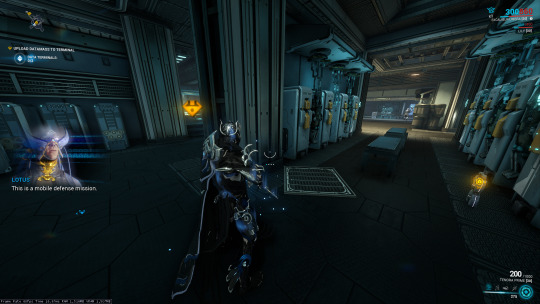
Top image of this section is from a review of closed beta in december 2012 (http://xkrieg.blogspot.com/2012/12/warframe-beta-impression.html) Bottom one is my own screenshot dated today, November 16, 2022 (click it to see full res, tumblr compression kind of sucks for images of that size)
71 notes
·
View notes
Text
hm was thinking about how i do semi regularly factor in 'i enjoy harsh noise' into a lot of my internal commentary about my breadth vs depth of enjoyment of music. and i was like well to be fair and related to the whole not listening to music independently that much i have only listened to a bit of noise and not recently. so i played some hijokaidan to double check and gotta say okay. like a given merzbow track is a lot more of a song than this. and i prefer the more song-shaped one. but i think most people do not like merzbow either so i'm not sure that harms my cred here and secondarily i do still not actually *dislike* this hijokaidan song supposedly named Beyond (does not appear on their wikipedia discography page)
2 notes
·
View notes
Text
Okay so, I'm thinking about Will and Henry, and I kinda wanna know what other people think about this.
I know a lot of people say that Will and Henry are foils. But I was reading about foils and mirrors, and I realized that Henry is a foil as well as a mirror for Will.
I'm gonna quote a few articles, and then explain what I think
"almost certainly share personality traits, values, similar skill sets, and possibly even goals and likely a narrative arc. They may have the same or similar background... If they have none of the same backstory at all, their similarities will be significant for coming about regardless of their environment."
"the similarities serve to highlight something important about the characters and their story"
"While a Mirror is seen as the literary opposite of a Foil, in truth the tropes often overlap and a character's Foil and Mirror can be the same character."
"The characters in each pair reflect one another’s similarities while contrasting their differences in approaching those similarities. "
"In the classic story of Good vs. Evil, the hero and villain play the other's foil, in that each acts to show how the other behaves in certain situations. But virtually any story with multiple characters can use contrast to show greater depths to them; two persons do not have to be on opposite ends of the moral spectrum to be foils."
"On the darker side, this trope can also be used to lampshade the fact that our hero is really just a hair's breadth away from villainy. In these specific cases, it's almost always the villain who is the first to notice"
"Closely related to Foil, which is a literary term that describes a character who highlights and accentuates the traits of another character by contrast, and Mirror Character, which describes characters highlighted by similarities. However, in these cases, lampshading isn't required."
My thoughts:
I think that Henry is both. And I'm sure I'm not the only person that thinks that, but this is my first time really truly thinking about it.
I think that in s4 he acts as more of a mirror than a foil. If mirrors are characters highlighted by similarities, s4 Will and Henry are mirrors. I mean, in s4, they were shoving Henry's similarities to Will in our faces. So much so that a lot of people walked away from s4 thinking that it foreshadowed Will's villain arc. And while I never believed that, I couldn't necessarily blame people for thinking it. Because they were screaming at us that these characters are extremely similar. And a lot of people think that must mean Will is destined to make the same choices Henry made. But that's not the purpose of a mirror. From what I understand, the purpose of a mirror is to show that these characters may be similar, but those similarities don't mean they have to make the same choices. Henry was angry at the world when he was a kid, so he killed his mother and his sister (because that'll fix things!!). Will is angry at the world (he's severely traumatized and gay in the 80s, of course he's angry at the world) but he doesn't take that out on anyone. In fact he is incredibly loving and caring and kind and gentle. He chooses love because it makes coping with the pain and anger easier.
I think in s5 we'll get to see more of Henry acting as Will's foil, while Will perceives him as a mirror, because of his distorted view of himself (when you're different, sometimes you feel like a mistake") until someone else (likely Mike considering "you make [me] feel like [I'm] not a mistake at all") calls bullshit on that. I think Will's arc in s5 will require him to identify their differences and develop a better understanding of himself.
I know Will would never choose evil. But does Will know that? I know Henry and Will are not truly the same. But does Will know that?
So, yeah I think Henry is a mirror foil, but I think s4 focused more on the mirror part, and s5 Will focus more on the foil part.
Does that make sense?
8 notes
·
View notes
Note
What are we calling a "new convert?" When does one actually get to "teach theology?" I understand the essential point of learning about something and having experience with something before presenting oneself as an expert, but I worry that the post needlessly divides people of faith and negates the insights of those who haven't had the privilege of being raised in your specific religious tradition. Engage in dialogue with "new converts," recall how fortunate we are to come from, in many cases, a tradition of "new converts," and approach these people as fellow siblings, misguided or otherwise, not a dangerous scourge upon perfect theology.
I’m going to answer your questions/points one at a time, as charitably as I can while not making an enormous post so please bear with me, the answers will be under the cut. Also, I am writing within an Eastern Orthodox Church context.
What are we calling a "new convert?"
“Catechumens will hear the word for three years. Yet if someone is earnest and perseveres well in the matter, it is not the time that is judged, but the conduct.” (Hippolytus’s Apostolic Tradition Chapter 17)
I would say that a new convert is anyone who has been a communing Orthodox Christian for less than at least one liturgical cycle from when you were received, (e.g. Received on Pascha to Pascha a year later). Someone may say “but I attended services for 10 years, I read a lot of books, I know all the theology and traditions!” that may be so, but the Mysteries are efficacious. You are changed by them. You need time to be changed by them and fully immersed. It takes time to develop an Orthodox mindset or viewpoint (phronema). This is where cradles have the advantage, even the cradles of converts.
But this is the real point, and it’s a matter of humility and obedience. Converts often measure their “spiritual age” or how long they have been in the faith e.g. “I’m 6 months old – a spiritual baby.” The Orthodox faith is an ocean, and any member is like a person standing in the tide trying to comprehend the depth and breadth of the faith. A new convert is like a toddler trying to scoop the ocean. God, the Gospel, doctrine – all of these are complicated.
Catechesis is important (but ultimately varies in quality from place to place). Your even year-long catechism does not cover every aspect of the faith, and certainly not every aspect of every tradition of the faith (Russian vs Greek practice). The faith is very hard to understand. It requires humility, obedience, and patience. And putting in the time living in your parish community is extremely important.
When does one actually get to "teach theology?"
Properly, one gets to teach theology when granted teaching authority by a bishop. For example, a priest is given the authority to preach by their bishop. If you insist on a number of years I would think someone who has been Orthodox for 5-10 years can start to say what the Church teaches if the occasion arises. But I know priests who insist converts do not say much other than “Come and See” for 10 years. Let your new life and new manner of being be a demonstration rather than words you read from a Father you misunderstand. Everyone (new converts and cradles) should spend far more time in prayer and services than in discourse. (Of course a new convert can give rough explanations to their family who want to understand why they are choosing Orthodoxy).
But ultimately, if you are not accountable to your priest and your bishop for what you say, you have no authority to rightly speak. Every liturgy we pray that our bishops “rightly divide the word of truth.”
In the Orthodox Church, we try to do things with the Church’s blessing. If you want to teach, receive a blessing. Be accountable.
I understand the essential point of learning about something and having experience with something before presenting oneself as an expert, but I worry that the post needlessly divides people of faith and negates the insights of those who haven't had the privilege of being raised in your specific religious tradition.
It’s not a needless division. See the problem with “Orthobros” and Internet Orthodoxy at large. And you’re right, it is a privilege to grow up in the Orthodox faith. I’m sorry if my post upset you, as it was not my intention.
As far “negating insights” let me be clear. I am perfectly happy to hear from my convert friends (and often do) about what they found intriguing or different about Orthodoxy. I value the opinions and insights of my Anglican or Pentecostal friends who are well-equipped to describe why and how their churches fell away or drove them away. But as far as insights into Orthodoxy, there I will take some issue (I’m going to be charitable and assume you aren’t talking about insights into Orthodox doctrine other than comparative to other faiths). But to be clear, a new convert has no business trying to explain complicated doctrine to random people on the internet, or even people they know. Because a new convert cannot verify they are speaking correctly. And that’s okay! And I understand the urge to share this beautiful faith you’ve discovered and your life is changing and God is so good. But new converts lack stability and foundation. They just don’t have the practice and immersion yet. It’s like telling someone who passed French 3 that they are fluent now. Yeah maybe they have the grammar basics down, but they lack the vocabulary of a native speaker or a 10-year speaker.
Engage in dialogue with "new converts," recall how fortunate we are to come from, in many cases, a tradition of "new converts," and approach these people as fellow siblings, misguided or otherwise, not a dangerous scourge upon perfect theology.
Anon, I love you but it’s a little odd to call for me to engage in dialogue while Anonymous. If you want to reach out to me, feel free, but no obligation. As far as engaging, I think it's not my place to directly correct people on tumblr. It would be like boiling the ocean for one. And two, I think online interactions are inherently prone to confusion and reading bad intentions into every situation. So I'm not looking to rebuke anyone who is not under my authority (like my godchildren).
Obviously I love and cherish every new convert. And I thank God for the enormous numbers of converts coming to know Christ in His Church. I think you’ve read in a little into my post, I don’t recall describing anyone as a dangerous scourge. But I will say, you are responsible for the ones you teach. Look to James 3:1-2;13
“My brethren, let not many of you become teachers, knowing that we shall receive a stricter judgment. For we all stumble in many things. If anyone does not stumble in word, he is a perfect man, able also to bridle the whole body... Who is wise and understanding among you? Let him show by good conduct that his works are done in the meekness of wisdom."
Lastly, I'll end with a quote from His Grace Bishop Gerasim of Fort Worth. It's not 100% to your point, but I think it's near enough that it's worth sharing. God bless you for taking the time to read this, and forgive any errors or failures within.
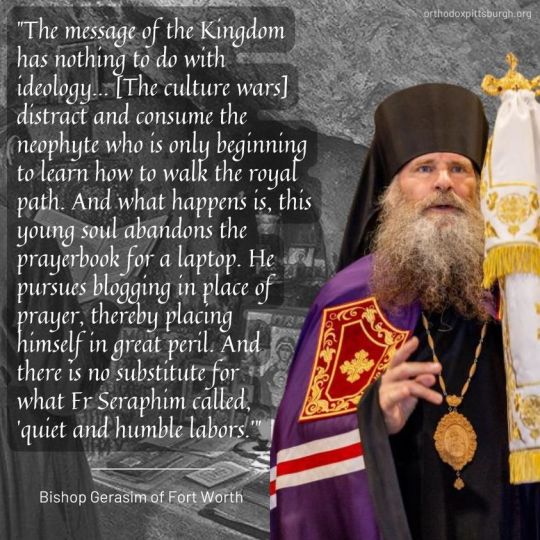
7 notes
·
View notes
Text
soooo many way too long posts in my head recently. recycling has been on my mind a good bit but that's mostly a very narrow band (plastics recycling and why it is actually difficult and you can't wave the capitalism-be-gone wand and have it magically work), which I really do not have the depth OR breadth of expertise in to feel like I could write about without unintentionally excluding something important. and I don't know much at all about e.g. construction materials recycling, fiber goods recycling, or even metal/glass recycling esp w/r/t "what is actually hard" vs "what is actually easy." but it's something I'm actively reading a bit more about from an engineer's perspective
2 notes
·
View notes